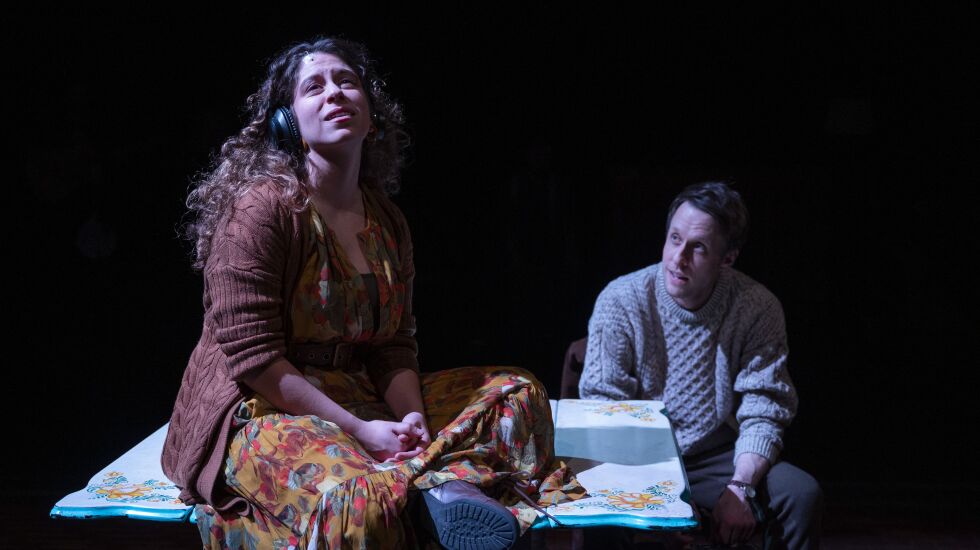
Despite winning the Tony Award for best musical in 2012, “Once” is not a musical at all, one could argue, but a play with music.
Based on a 2007 independent Irish film — very much a film with music — “Once” tells a deeply modest tale of two characters, generically named in the script as Guy and Girl. Guy is a singer-songwriter, very much of the two-thousand-aughts variety. Girl is a Czech immigrant to Dublin who plays the piano and is drawn to Guy’s music. The story follows their fast-evolving friendship, and perhaps more — that “more” being problematic as each musician has a non-present but unfinished relationship to deal with.
Along the way, we hear Guy’s songs, most achingly pretty ballads about falling in love, painfully, and losing that love, even more painfully. The show’s signature song, “Falling Slowly,” holds the distinction of winning Oscar, Tony and Grammy recognition, or the famed EGOT without the Emmy.
But the characters never leave the reality of playing their songs as songs, and the lyrics don’t advance the story directly as they would if you think of musical theater as a genre, and not just a description. In the film, the composers of the music — Glen Hansard and Marketa Irglova — starred as a version of themselves.
I don’t want to belabor the distinction between play with music and musical, but the point is that “Once” is a minimalist piece. It has a delicacy to it; it requires all the exactness and precision of a play, as well as an understanding that the music actually does advance the story even if not in the traditional way.
This was book writer Enda Walsh’s contribution in the adaptation of the tale from screen to stage. Walsh, an inventive and often irreverent Irish playwright, surfaced the deeper underlying themes in “Once.” He pinpointed Guy and Girl as being “stopped,” unable to move on with their lives. He recognized that those lovely songs — performed with intensity and passion — contain within them the cure itself, the ability to go for it, to dive into life with intensity and passion, risking failure and agony.
Amid a spare theatricality where the ensemble is always present and plays a variety of string and percussion instruments, Walsh created the conditions for those folky-pop tunes to swell into arias of life triumphing over fear without becoming saturated with sentimentality.
The Writers Theatre production, directed by Katie Spelman (most recently choreographer of the theatricalized musical “The Notebook”), possesses an enormous amount of competence. It captures the loveliness of the music, the likability of the characters, the fluidity of the staging, the sweetness of the ending. But, as of opening, it is lacking both the precision and the passion that ultimately make “Once” genuine, unique, special.
Talented performers Matt Mueller and Dana Saleh Omar haven’t yet found authenticity in the sexual and emotional connection between the romantic leads. Given the restraints of the romance, much of that needs to be communicated through an expert timing that invests their instant rapport with a humorous ease. And although the songs crescendo in volume as additional instruments join, there’s no swelling of the deep-down feelings that tell Walsh’s deeper-down story.
The ensemble — which includes Guy’s father (Ron E. Rains), Girl’s family (Bethany Thomas, Liam Oh, Viva Boresi) and other supporting players (Yuchi Chiu, Elisa Carlson, Matt Deitchman, Elleon Dobias, Matt Edmonds, Jordan Golding, and Lucas Looch Johnson) — plays many instruments and delivers moments of appealing quirkiness. But there are also times when the scene transitions and passing of instruments become fussy, and comic moments can feel pushed rather than honestly played, as if we really were in musical comedy-land, which we aren’t.
The design work here can feel underdone — Joonhee Park’s set never manages to express a sense of Dublin — and overdone: Gregory Graham’s costumes for Girl and her mother go way over-the-top on their Eastern European-ness. Many of these issues are perhaps resolvable over the run, and “Once” still has a lot going for it. But what was once upliftingly emotional is currently on the precipice of preciousness.







